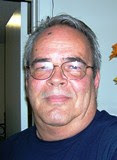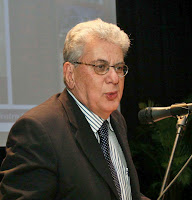ELECCIONES 2012: DEBATEN PROYECTO DE LEY PRESENTADO POR DAVID RIVERA PARA HACER CAMBIOS A LA LEY DE AJUSTE CUBANO
 |
| Humberto J. San Pedro |
David Mauricio Rivera (nacido en Nueva York, NY, el 16 de setiembre de 1965) es el congresista federal que representa al distrito # 25 de la Florida. Es miembro del Partido Republicano.
David Mauricio Rivera nunca ha vivido en Cuba, ni --hasta donde conozco-- la ha visitado. Pensamos que lo sumo habrá visitado la Base Naval de Guantánamo, que no es territorio cubano, como lo han hecho en el pasado otros congresistas cubano-americanos.
David Mauricio Rivera, representante federal por la Florida, presentó el 1º de agosto del 2011 el proyecto de ley puesto a debate ayer.
Rivera ha sido, desde que comenzó a hacer campaña política para el congreso estatal, un férreo opositor a toda medida de acercamiento o flexibilización al gobierno cubano.
El Subcomité de Inmigración de la Comisión de Asuntos Judiciales de la Cámara de Representantes comenzó a debatir el tema en una sesión que comenzó ayer, jueves 31 de mayo de 2012, a las 2 p.m.
El anuncio del inicio del debate ha generado una fuerte polémica y reclamos de una parte de la comunidad cubanoamericana que rechaza la posibilidad de que le retiren el estatus migratorio a quienes viajen a la isla antes de ser aprobada su ciudadanía estadounidense.
El congresista alega que su: “[…] propósito es terminar con los abusos y creo que reformar la Ley de Ajuste Cubano ayudará precisamente a garantizar el mantenimiento de los beneficios de residencia para aquellos que pidan asilo político en el futuro. En otras palabras, tenemos que ajustar la ley para salvarla”.
No podemos negar que David Rivera ha demostrado poseer valores tales como la tenacidad, la firmeza y la perseverancia –este redactor está consciente de que los tres vocablos anteriores son sinónimos, pero considera que en este caso es necesario usarlos para enfatizar-- en la lucha por lo que él considera la justicia.
Eso, mis queridos lectores, es muy loable.
Sin embargo, el análisis objetivo de lo que Rivera declaró al “Nuevo Herald” ayer, que citamos en un párrafo anterior, y lo que dijo –con vehemencia tal que rayó en la descortesía, pues casi no dejó hablar al periodista-- durante dos entrevistas que le hizo el destacado periodista Oscar Haza, en su popular programa “A Mano Limpia” del canal 41, nos genera una interrogante. Interrogante, que a fuer de sinceros, nos inquieta considerablemente:
•¿Estará el congresista pisando terreno firme?
•¿Habrá analizado con la debida minuciosidad sus razones?
•¿Habrá ponderado objetivamente el daño que pudiera causar o estar ya causando su Santa Cruzada?
Nuestro propósito no es --en modo alguno-- censurar al congresista Rivera. Por el contrario, nuestro propósito es seguir su ejemplo: luchar con tenacidad, firmeza y perseverancia por que se haga justicia.
Para finalizar, ponemos a disposición de los lectores el texto de la Ley de Ajuste Cubano, cuya lectura seguramente los ayudará a llegar a sus propias conclusiones sobre este candente tema.
Rad more here: http://www.elnuevoherald.com/2012/05/31/1216490/debatiran-cambios-a-la-ley-de.html#storylink=cpy

| Fact Sheet: The Cuban Adjustment Act As released by the Office of Cuban Affairs, Bureau of Western Hemisphere Affairs, Department of State, March 16, 2000 |
Public Law 89-732
The Cuban Adjustment Act (CAA), Public Law 89-732, was enacted on November 2, 1966. The law applies to any native or citizen of Cuba who has been inspected and admitted or paroled into the United States after January 1, 1959 and has been physically present for at least one year; and is admissible to the United States for Permanent Residence.
Legal Migration to the United States
Cubans in Cuba can legally migrate to the U.S. through various migration programs that include immigrant visa issuance, refugee admission, the diversity lottery, and the Special Cuban Migration Program (SCMP), otherwise known as the Cuban lottery.
Immigrant visas are issued to the parents, spouses and children (unmarried and under 21 years of age) of U.S. citizens as soon as the immigrant visa petition is approved by INS.
Immigrant visas are also available to a range of persons who can qualify for family or employment-based visas under the preference system that controls numerically limited immigration to the United States.
The preference system allows US citizens to bring their siblings and their adult married children to the United States. Lawful permanent residents of the United States can petition for petition for their spouses, minor children, and unmarried adult children). The waiting period for preference visas varies by category.
Those who have been persecuted in Cuba, or who fear persecution (on the basis of race, religion, nationality, membership in a particular social group, or political opinion), may apply for U.S. resettlement through our in country refugee processing unit at the U.S. Interests Section in Havana.
The diversity visa program is also available in Cuba. There are 55,000 visas available annually to eligible applicants from around the world. For the three years that we have statistics, the successrate for Cuban applicants is quite high. In 1996 approximately 67% of those registered were issued visas, in 1997 the success rate was 69% and in 1998 a total of 73% of Cuban applicants who applied for the diversity visa program were issued visas.
The Special Cuban Migration Program, or "Cuban lottery," is open to all adult Cubans between the ages of 18 and 55 years of age who are resident in Cuba regardless of whether they qualify for our immigrant visa or refugee programs. The lottery provides an avenue of legal migration to a diverse group of Cubans, including those who might not have close relatives in the United States. The last registration period was held from June 15- July 15, 1998. The next registration period has not yet been determined but we anticipate that it will take place in 2001.
[End of Document]



.jpg)
Comentarios
Publicar un comentario